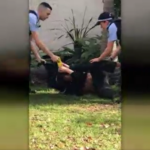Drunk Probationary Cop Assaults Terrified Woman While Waving Badge

A 41-year old NSW police officer might have just had the shortest career ever with the state’s Police Force, after being caught on camera assaulting a woman and trying to arrest her while off duty, after a drunken night out.

CCTV footage shows the officer chase and then grab the terrified woman by the back of the neck when she seeks refuge inside a bank’s after hours ATM area.
The officer holds her with one hand as he waves his badge in the air.

The woman calls for help, and a member of the community, 21 year-old Levi Minchin, steps in.
Mr Minchin reports that he saw the man heckling the young women on Tucker Street in Ryde moments beforehand, and took it upon himself to help.

Mr Minchin is seen getting between the two and trying to diffuse the situation.
He reports telling the told the off-duty officer to leave the woman alone. The officer is then seen to grab him around the body, before Mr Minchin spins his body, causing the intoxicated officer to be thrown to the ground just outside the bank.

Mr Minchin then performs what is known as a citizen’s arrest, which is something he is legally entitled to do under section 100 of the Law Enforcement (Powers and Responsibilities) Act 2002 when witnessing a perpetrator committing a criminal offence, including an offending police officer.

Drunken ‘power trip’
Mr Minchin reports that the officer was swearing aggressively, and told him that he was “gone”, “finished” and that the young man didn’t “know who you’re fucking with.”

He says the officer “kept saying he was a police officer like that was the definition that he could do what he wanted.”
The officer graduated from the police academy just a few weeks ago.
He has now been suspended from the NSW Police Force, and has since handed in his newly minted badge.
He has also been charged with two counts of common assault.
A spokesperson for the NSW Police Force says the officer has been terminated for “bringing the force into disrepute and not upholding the values expected.”
Police brutality
It’s certainly an embarrassing and serious indictment on the NSW Police Force which has already strained relationships with many sectors of the community, given the increasing number of reports about, and footage of, officers engaging in criminal conduct.
To recap some of the most recent from 2020:
Two Sydney Wales Police officers have been charged with sexual assault offences against a 17-year old school girl. Their case is before the courts and they have both been suspended from the NSW Police Force.
Last month, a female police officer from the Newcastle region was charged with a domestic violence offence and this case is also currently before the courts and she is currently on long term leave.
Earlier this year it was revealed that a senior officer remains suspended on full pay despite being found guilty of the offence of sexual touching a female colleague at a Christmas Party.
Another police officer from Northern NSW has been suspended despite being charged with posessing child abuse material. And yet another, from Goulburn remains employed on ‘restricted duties’ by NSW police despite being found guilty of assaulting an indigenous man in custody.
These are only a handful of cases, and some suggest they’re simply the ‘tip of the iceberg’.
Lack of consistency in accountability
But what they also illustrate is the concerning lack of consistency with which NSW Police deals with misconduct by officers.
All police officers sign an oath to serve and protect, and any deviation of that oath should automatically result in serious consideration of employment status.
However many are suspended on full pay, or at least suspended (meaning the option remains open for them to return to their jobs) until the completion of the justice process, which can drag on for months, even years.
It seems that those in authority tend to forget that taxpayers fund the police force at a cost of at least $3.4 billion each year.
The taxpaying community most certainly has expectations around transparency and accountability for police behaviour. It should certainly follow that any officer which brings the “force into disrepute and does not uphold the values expected”, say for example, by being suspected of, or charged with, a criminal offence, should have employment terminated, immediately, and without the need for any further explanation.
Certainly in the private sector any employee who brings an organisation into disrepute or breaches company policy faces serious consequences, often dismissal. It is not unreasonable for the general public of NSW to deserve similar standards from its publicly funded police force.








